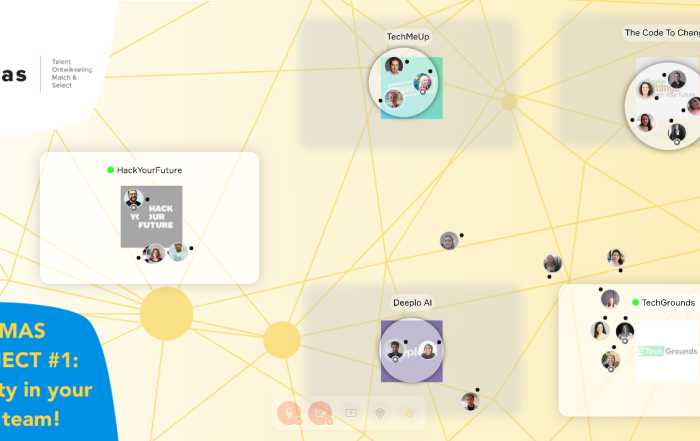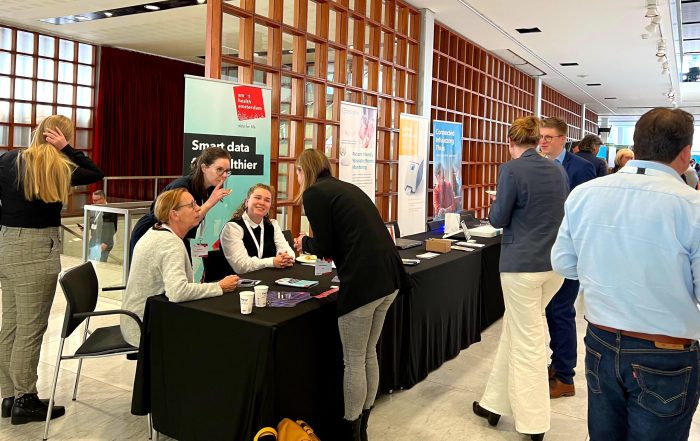Michiel van Vlimmeren (Salesforce): ‘Combine your forces’
Whether it concerns diversity, sustainability or health: the themes that the Amsterdam Economic Board works on are often high on the agenda of our Network Council members. We're interviewing Michiel van Vlimmeren, senior vice president and general manager Salesforce Netherlands. The service provider in the field of CRM technology contributes to these themes in various ways.
Diversity and inclusion are important to you. Why?
“This is indeed a prominent theme for us, which has everything to do with one of our core values: equality,” says Van Vlimmeren. “We believe that we as a company can contribute to social change by focusing on this. In the Netherlands, this mainly translates to a focus on gender diversity. Here lies the biggest challenge. In recent years we have worked on increasing the percentage of women. We are now at 29 percent, so continuous attention and incentive remains important. It is my personal goal that 50 percent of the management team in the Netherlands consists of women and we are almost there.”
How did you manage that?
“By setting concrete goals and linking all kinds of initiatives to those. For example, we have a very active women’s network that not only gets together, regularly but also actively contributes ideas about our policy. For example, about how we can focus our job descriptions more on women in recruitment, how we can better organise the application procedure and how we can retain female colleagues. We also check yearly how we do on equal pay and adjust the pay if necessary.”
You now work in a fairly diverse team. What can you tell us about that?
“The strength of a team is not so much about each individual being very good at their job. Balance makes success in a team. Different backgrounds provide different insights and experiences. These ultimately benefit the quality of decision-making and therefore the quality of the organisation.”
Your attention to this matter is also interesting from a business perspective: you’re widening the net to attract potential employees.
“That is definitely true. There are currently about 85,000 vacancies in our industry. So if we want to stay competitive as a country, we need to get more people interested in the digital domain, showing them you needn’t only be a programmer to work in the technology sector. This already starts in primary education. I am a board member of the NLdigital sector organisation and holder of its education and labor market portfolio. In that role, I am also working on getting this embedded in our education systems.
There are many great initiatives around this subject and companies are often already working on it. The trick is to combine forces, scale up initiatives and increase impact. For example, we support Techgrounds, an initiative of TechConnect. Here we train people in a short time to become, among other things, Salesforce consultant or developer. The people who follow this training are guaranteed a job, either with our partners or our end customers. This works very well for us, we can contribute based on our knowledge and thus fulfill the broader need for Salesforce professionals. And most importantly: we help people who are at a disadvantage in this labor market and give them better opportunities.”
As mentioned, there are many great initiatives around this theme. So why is it not possible to take big steps?
“It’s not so much about what we do: a lot of great things are already happening that also have an effect. Only: that effect is still small. The biggest challenge is therefore scalability and utilising everyone’s strengths. This is only possible if the triangle of government, education and business works well together. The Amsterdam Economic Board greatly contributes to this. Educational institutions used to be a bit skeptical about the participation of the business community in these kinds of initiatives, but I think that as an industry we have now shown that we really want to make a contribution and that it is not just about filling our own vacancies. Co-Teach Informatica is a good example: we work with universities and companies on better informatics education in secondary schools. The government is also important for this challenge: it must set the frameworks and ensure regulations surrounding curricula.”
Like the Amsterdam Economic Board, you are also involved in data exchange in healthcare. For example, in 2019 Salesforce signed the Manifesto ‘Samen Vooruit’ (Forward Together). This focuses on accelerating a secure and standardised exchange of data in healthcare.
“Correct. We believe that digitalisation can make a significant contribution to keeping healthcare affordable and improving it. But the complexity of the chain makes this a difficult matter. It’s about dealing with a variety of suppliers, with different health institutions, with insurers and strict regulations. To be able to exchange data, for example, integration is needed between parties that offer medical equipment and parties that can access and process that data and bring it back to the patient. This has to be done in open systems. So for us it’s not about ensuring this can only be done via Salesforce software. That is why we are also on the Health Care Committee of the American Chamber of Commerce in the Netherlands. As with the Amsterdam Economic Board, different types of companies are working together to improve healthcare. I know about your Health Data Infrastructure initiative. We are still investigating how we can contribute or what we can learn from it. I think that we have a lot of knowledge to share about this subject, as well as about diversity and inclusion, while at the same time bringing and collecting a lot of inspiration from other organisations.”
Text: Mirjam Streefkerk
9 May 2022
Read more about
Contact us
Want to keep up to date?
Get the best regional news and events (in Dutch) via the Board Update newsletter
Share this news
Want to keep informed?
Follow us daily on LinkedIn and sign up for the Board Update newsletter.
Read more
- What AI applications are we already deploying for healthcare and wellbeing? What ...
- Adyen is one of the great success stories of Amsterdam’s tech ...
- Together with enthusiastic partners in three coalitions, the Amsterdam Economic Board is ...





